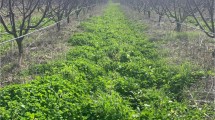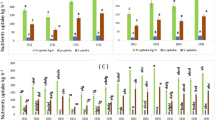Abstract
A field experiment was conducted to investigate the effects of intermittent versus continuous irrigation, together with different degrees of organic fertilization, on the growth and yield of hybrid rice, looking also at the functioning of the rhizosphere as this is a key element affecting crop performance. The crop management practices employed generally followed the recommendations of the System of Rice Intensification (SRI). The aim of the research was to learn how water management and organic fertilization together would affect crop outcomes. Under intermittent water application as recommended with SRI management (aerobic irrigation, AI), grain yield increased by 10.5–11.3%, compared to standard irrigation practice (continuous flooding, CF). The factor that contributed most to higher yield was increased number of grains per panicle. It was seen that under the range of organic fertilization treatments evaluated, intermittent irrigation compared with CF promoted greater dry matter production and higher leaf area index (LAI) during the main growth stages. Also, the combination of intermittent irrigation and organic material applications significantly increased soil redox potential (Eh), compared with CF, and also the numbers of actinomycetes in the rhizosphere soil. Actinomycetes were evaluated in this study as an indicator of aerobic soil biota. It was seen that with intermittent irrigation, the application of organic material improved the functioning of the rhizosphere and increased yield. However, these results based on 2 years of study reflect relatively short-term effects. The effects of longer-term water management and soil fertilization regimes should be also examined, to know whether these effects continue and, if they do, whether they become greater or less.




Similar content being viewed by others
References
Anas I, Rupela OP, Thiyagarajan TM, Uphoff N (2010) Effects of SRI on beneficial organisms in rice rhizospheres and soil. Paddy Water Environ (this issue)
Arslan E, Öbek E, Kirbag S, İpek U, Topal M (2008) Determination of the effect of compost on soil microorganisms. Int J Sci Technol 3:151–159
Bouman BA, Tuong TP (2001) Field water management to save water and increase its productivity in irrigated lowland rice. Agric Water Manag 49:11–30
Lei M, Ding W, Cai Z (2005) Long-term application of organic manure and nitrogen fertilizer on N2O emissions, soil quality and crop production in a sandy loam soil. Soil Biol Biochem 37:2037–2045
Lin XQ, Zhou F, Zhu DF (2006) Nitrogen accumulation remobilization and partitioning in rice (Oryza sativa L.) under an improved irrigation practice. Field Crops Res 96:228–454
Mishra A, Salokhe VM (2010) The effects of planting pattern and water regime on root morphology, physiology and grain yield of rice. J Agron Crop Sci. doi:10.1111/j.1439-037X.2010.00421.x
Ramirez LMA, Claassen N, Ubiera AA (2002) Effect of phosphorus, potassium and zinc fertilizers on iron toxicity in wetland rice (Oryza sativa L). Plant Soil 239:197–206
Singh Y, Singh B, Ladha JK, Khind CS, Gupta RK, Meelu OP, Pasuquin E (2004) Long-term effects of organic inputs on yield and soil fertility in the rice–wheat rotation. Soil Sci Soc Am J 68:845–853
Solaimalai A, Sivakumar C, Chandrasekaran R, Sankaranarayanan K, Sudhakar G (2000) Water management practices for rice—a review. Agric Rev 21:53–59
Tan ZJ, Feng YH, Liu F (2004) Effects of rice-based cropping system and organic manure on microbes and enzyme activities in paddy soils derived from red earth. Chin J Eco-Agric 12:121–123
Timsina J, Connor DJ (2001) Productivity and management of rice–wheat cropping systems: issues and challenges. Field Crops Res 69:93–142
Yang CM, Yong L, Yang Y, Zhu O (2004) Rice root growth and nutrient uptake as influenced by organic matter in continuously and alternately flooded paddy soils. Agric Water Manag 70:67–81
Zhao LM, Wu LH, Li YS, Lu XH, Zhu DF, Uphoff N (2009) Influence of the System of Rice Intensification on rice yield and nitrogen and water use efficiency with different N application rates. Exp Agric 45:275–286
Zhong FN, Liu SF (2010) Water: an emerging critical factor in Chinese rice production and trade. In: Fukashi K et al (eds) Sustainability in food and water: an Asian perspective. Springer, Berlin, pp 219–230
Zhu ZL, Chen DL (2002) Nitrogen fertilizer use in China: contributions to food policy, impacts on the environment, and best management strategies. Nutr Cycl Agroecosyst 63:117–127
Author information
Authors and Affiliations
Corresponding author
Rights and permissions
About this article
Cite this article
Lin, X., Zhu, D. & Lin, X. Effects of water management and organic fertilization with SRI crop practices on hybrid rice performance and rhizosphere dynamics. Paddy Water Environ 9, 33–39 (2011). https://doi.org/10.1007/s10333-010-0238-y
Received:
Revised:
Accepted:
Published:
Issue Date:
DOI: https://doi.org/10.1007/s10333-010-0238-y




